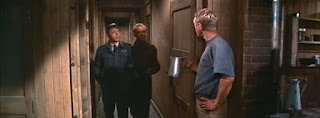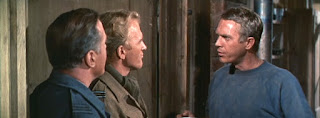The Story: The success of John Sturges' The Magnificent 7 allowed the director to gain traction on a project he'd been trying to get going for ten years, a film of Paul Bricknell's account of an elaborate Allied escape from a German POW camp during the second world war—what would ultimately be released as The Great Escape.
But, if Sturges thought his next movie would go as smoothly as his previous one, he was mistaken.
The Magnificent 7 was a westernized version of Akira Kurosawa's The Seven Samurai, transplanted from feudal Japan to Mexico, but keeping the Japanese director's disparate characterizations of the swordsmen. Featuring an impressive array of "young turk" actors (herded, as it was, by Yul Brynner), all of whom were jockeying for screen-time and to be noticed.
Horst Buchholz was probably the most egregious at attracting attention to himself (but then, he had the Toshirô Mifune part). But, the actor most folks complained about trying to "upstage" them was Steve McQueen, fresh off three seasons of the TV series "Wanted: Dead or Alive" and wanting to make his mark back in films. Yul Brynner was a particular target of McQueen's show-boating, but he'd seen all this before. "All I have to do is take off my hat," he said.
When it came time for The Great Escape, Sturges had in mind another star-studded cast and he pursued McQueen—who hated the script. His character, Virgil Hilts, didn't have enough to do, wasn't important enough to the story, and...McQueen wanted to show off his motorcycle skills.** McQueen wanted a major re-write, favoring him...and riding a motorcycle. Sturges was willing to let him go, but the financing studio, United Artists, wanted McQueen, and so Ivan Moffat was brought in to re-write James Clavell's and W.R. Burnett's script to beef up his part.
Richard Attenborough played the man behind the break-out scheme, Bartlett code-named "Big X", and he was a last-minute replacement for Richard Harris, who was stuck filming This Sporting Life, which was going over schedule. Attenborough remembered that dealing with McQueen on-set was, in those days, problematic—McQueen would walk off the set if unhappy and was constantly looking over his shoulder to see if anybody was up-staging him. Yet, for all the prima donna attitude, McQueen was only making $87,500 for a top-billed role, while his second, James Garner, made $150,000—no doubt due to Garner's popular run on the TV series "Maverick" and subsequent film roles.
Check out today's scene, which was drastically re-written from the original* to set off McQueen's position as a rebel and reluctant joiner. In fact, McQueen's role became, for a good portion of the script, quite separate from the rest of POW's and only comes into play towards the end.
And he gets the motorcycle chase.
Reading the original, Hilts is deferential, coming to Bartlett's quarters to ask questions about the escape plan, which he has doubts about. In the film, Bartlett and MacDonald go to him. McQueen works his dialog around delaying bits of business, making you wait for his words. Pretty good strategy, that.
But Attenborough and counter-attack it quite efficiently. Yes, they appear in the weaker position, sitting down throughout the whole scene and waiting for Hilts to show up to his room. As written, they don't have much control of the scene. As played, however, it's another matter.
Here, Bartlett and MacDonald are completely in command, casual, with a mission to make Hilts do something he's determined not to do given his nature. They know he's a lone wolf and a renegade, and they see using that as a challenge as much as getting rid of tunnel dirt, or making uniforms and civilian clothes out of scraps and blankets. When Hilts refuses, they acquiesce and are completely genial about it...waiting for Hilts' weak spot to show its hand. They'll agree with him completely and concede every point until he works himself around to doing what they want. Attenborough's Bartlett, in particular, rarely looks Hilts in the eye, seemingly seceding any authority, and certainly not trying to impose any military authority over Hilts' American POW, and his hemming and hawing just keeps your attention a moment or two longer, the staccato rhythm giving you the impression he's making it up on the spot.
It's a wonderful strategy—and it's both in the story and in the staging—where you use the other player's ego against them.
That's how you upstage Steve McQueen: you play it cooler than he does.
The Set-Up: World War II; a German camp for Allied POW's, specifically those who have the nasty habit of constantly trying to escape. To disrupt Germany's war effort, British Squadron Leader Bartlett (Richard Attenborough) coordinates a mass escape from the compound to distract German units from the war effort. The plan is to take out 250 men, and they have all the details worked out, but they need more information—information they can only get from the outside. And so Bartlett and the camp's intelligence officer MacDonald (Gordon Jackson) pay a visit to the camp's most frequent escape artis—"The Cooler King" Virgil Hilts (Steve McQueen).
Action.
BARTLETT: When?
BARTLETT: In fact, we have all the information we need, uh, for the escape routes out of Germany. But um...
HILTS: Is a clear...
HILTS: By morning, I'm gonna be so far away, you won't hear
if they're shooting at me with howitzers.
-
HILTS: Has it occurred to you
HILTS: You aren't seriously
suggesting that if I get through the wire
HILTS: and case everything out there
and don't get picked up,
HILTS: Well, OK, then.
Pictures by Daniel L. Fapp and John Sturges
The Great Escape is available on DVD, Blu-Ray, and Ultra 4K HD from M-G-M Home Video...and The Criterion Collection.
* Here's the scene in Clavell and Burnett's script (dated April 26, 1962) as it was originally written, before McQueen's requested re-write. As one can see, the "Hilts" character is clearly in the diminished position, asking permission and such to talk to Bartlett in Bartlett's room. In the film, Bartlett and MacDonald visit Hilts in HIS room.
Wearily he picks up the schedules, starts for the door. A
knock. Ashley-Pitt opens the door, reveals Hilts;
BARTLETT
Yes, Hilts?
HILTS
Do you have a minute?
BARTLETT
Certainly, come on in.
'Night, Eric.
ASHLEY-PITT
(closing door)
Sleep tight!
BARTLETT
Sit down, Hilts. Have you got
all your gear ready? Iron rations?
HILTS
Yes, thanks.
(after pause).
Just wanted to ask a couple of
questions if you don't mind.
BARTLETT
Shoot.
HILTS
Well. How many are going?
BARTLETT
Two hundred and fifty.
Hilts blinks, then smiles faintly.
HILTS
That's a mighty big number.
BARTLETT
It's a big plan. .
HILTS
What do you figure our chances?
To get that number out?
BARTLETT
Excellent. To get them out
permanently - very bad.
HILTS
(after a pause -
.perplexed)
I thought the whole idea was to -
well, escape. To get home.
Bartlett studies Hilts thoughtfully.
BARTLETT
It is. At the same time maybe it's
not quite so selfish. You might call
it a war effort. A lot of fellows
are carrying part of the war ball
we should be carrying. (beat)
I'll make it clear for you. (beat)
When one man escapes, this one man
diverts about a hundred goons from
their war effort if he's caught
within an hour. A thousand goons
if it takes them a day to catch him.
Ten thousand if it takes a week.
Soldiers - police - mainly. Say we
multiply that by two hundred and
fifty. Think of the monumental muck
up we'd cause the goons. Why we'll
involve millions - if we're lucky!
The whole bloody Reich - if we're
very lucky. ·
Hilts stares at him bug-eyed.:
HILTS
I thought I was blitz happy - but
you, you're the blitz king of them
all. (beat)
or wire happy~
BARTLETT
Who am I not to be?
HILTS
(after a pause)
Say we're not lucky. Say some guys get killed. You think that
monumental muck up would be
worth it?
BARTLETT
If it shortens the war by a day -
even by an hour - yes.
HILTS
Say it doesn't. What then?
BARTLETT
That's the measure of my
responsibility.
Hilts stares at him.
HILTS
Boy, this is one for the book.
(pause)
How many you figure'll make it?
BARTLETT
That's up to Lady Luck - or Fate
- or God - depending on your point
or view. (gently)
Look, Hilts. Escaping is always a
very personal decision, always a
volunteer operation. No one -
Big "X" or the senior officer -
no one orders anyone to escape,
or not to escape. You wouldn't
be wrong if you decided not to
go.
Hilts stares at him pop eyed:
HILTS
Oh, I'm going. Of course! I
just wanted to know the odds.
Going? Of course I'm going..
I just wanted to know the score.
Suddenly the air raid siren begins shrieking.
EXT. COMPOUND - NIGHT
HUNDFUHRERS
and their dogs react. Abruptly the searchlight vanishes.
Hut lights begin to vanish. Only gloom now ...
INT. BARRACKS - NIGHT
FULL SHOT
The barracks lights flicker and die. In the gloom, faces
react. Hope, pride.
OTHER FACES mixed with just a little fear on some.
INT. RAMSEY'S HUT - NIGHT
RAMSEY
looks up from the book he had been reading. Reacts,
grimly satisfied.
The siren begins to die.
EXT. COMPOUND - NIGHT
FERRETS AND GUARDS
ever more watchful in the blackness.
INT. BARTLETT'S ROOM - NIGHT
BARTLETT
and Hilts are listening. The siren dies. Silence.
Then faintly but distinctly the sound of bombs exploding,
and distant ack ack.
BARTLETT
The goon're catching a packet.
HILTS
(as thoughtfully)
Must be something big around
here to bomb so far from home.
BARTLETT
(after pause,
almost absently)
I often wonder where home is.
These days. ·
Hilts glances at him, then:
HILTS
Guess I'd better high tail it
'back.
But Bartlett is preoccupied listening -- filled with
longing, staring out or a window.
BARTLETT
(absently)
Thanks for dropping by.
Hilts exits.
** Sure, it seems petty...but 8 out of 10 videos of The Great Escape is Steve McQueen on a motorcycle. That's what people remember it for.
*** This may be my favorite line in the whole movie—they're ALREADY locked up. They're POW's!



















































































































